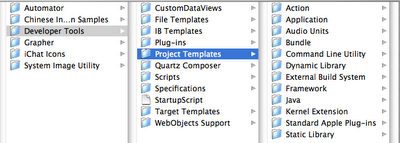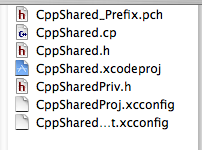So I wondered if I could use IDEA for working with the Java code and Xcode for managing the JNI bindings and the C++ code that goes with it. After a bit of playing around (primarily pulling bits and pieces from Apple's mini-tutorial on JNI with Xcode), I figured out how to build a JNI library that I can use easily from IDEA.
That got me to thinking about the four or five steps I would have to do each time I created a new one of these projects (which I expect to be doing for a while). I vaguely remembered a friend talking about customizing Xcode by creating new templates. So I set out to create one for building JNI libraries.
I googled around a bit and found out that Xcode keeps its templates in:
/Library/Application Support/Apple/Developer Tools
Looking there, I see a folder called "Project Templates", and sure enough inside are all the templates for Xcode projects.

There are several that look promising, but what's the difference between a "BSD Dynamic Library", a "C++ Dynamic Library", and a "C++ Standard Dynamic Library"? Something based on the "C++ Standard Dynamic Library" seems right.
So, I create a test project and make a few changes to produce a JNI library:
- Change "Executable Extension" to be "jnilib"
- Change "Header Search Paths" to include "$(SDK)/System/Library/Frameworks/JavaVM.framework/Headers"
- Delete the Carbon framework (why was it there in the first place?)
Now, save the project, make sure it builds (which it does) and create a simple Java HelloWorld with a native method that calls our Test class.
Having verified that this sort of project can be used to produce a JNI Library, it's time to create the custom project template. First I copy the "C++ Standard Dynamic Library template" to "JNI C++ Standard Dynamic Library". Now I need to find the right places to insert the additional items that were changed (and how to remove the Carbon framework). Looking at the template directory, I see a number of files.
 But most of these are just boilerplate for source files in the project ('.pch', '.h', '.cp'). I think I can safely ignore these files at least for now (though I made note of them; if there prove to be certain common files in my JNI libraries moving forward, I can come back and try to tweak the project template to have different boilerplates).
But most of these are just boilerplate for source files in the project ('.pch', '.h', '.cp'). I think I can safely ignore these files at least for now (though I made note of them; if there prove to be certain common files in my JNI libraries moving forward, I can come back and try to tweak the project template to have different boilerplates).The key 'file' appears to be CppShared.xcodeproj. Right-clicking on it shows it is really a 'package' and I take a look inside.

When I do so, I see two files: "TemplateInfo.plist" and "project.pbxproj". The '.plist' file has some interesting items about template files and lists of files upon which to perform macro expansion. Interestingly, the list of files matches the list of boilerplate files almost exactly. For now, I'm leaving these alone (again making note in case I want to change the set of boilerplate files in the project). There is also a Description item, which shows up in the "New Project..." window in Xcode. After tweaking that to make it better describe this new kind of project I'm creating, I move on to the "project.pbxproj" file.
The "project.pbxproj" file is semi-text and semi-binary. So it's time to be careful and make a backup before experimenting. The first section of interest is this:
/* Begin PBXFileReference section */
08FB77AAFE841565C02AAC07 /* Carbon.framework */ = {isa = ...
32BAE0B70371A74B00C91783 /* «PROJECTNAME»_Prefix.pch */ = {isa = ...
50149BD909E781A5002DEE6A /* «PROJECTNAME».h */ = {isa = ...
5073E0C409E734A800EC74B6 /* «PROJECTNAME».cp */ = {isa = ...
5073E0C609E734A800EC74B6 /* «PROJECTNAME»Proj.xcconfig */ = {isa = ...
5073E0C709E734A800EC74B6 /* «PROJECTNAME»Target.xcconfig */ = {isa = ...
50B2938909F016FC00694E55 /* «PROJECTNAME»Priv.h */ = {isa = ...
D2AAC09D05546B4700DB518D /* lib«PROJECTNAME».dylib */ = {isa =
PBXFileReference; explicitFileType = "compiled.mach-o.dylib";
includeInIndex = 0; path = "lib«PROJECTNAME».dylib"; sourceTree = BUILT_PRODUCTS_DIR; };
/* End PBXFileReference section */
I ditch the Carbon framework reference (since I'm doing JNI) by deleting the line that references Carbon. If I want to use Carbon in a JNI library, I can always add it later. It turns out there are a bunch of other references to Carbon in the template, and I have to remove those as well.
Now, I see the line that makes reference to "lib«PROJECTNAME».dylib". I want the library to end with '.jnilib' since that is required by Mac OS X. So I patch this:
D2AAC09D05546B4700DB518D /* lib«PROJECTNAME».jnilib */ = {isa =
PBXFileReference; explicitFileType = "compiled.mach-o.dylib";
includeInIndex = 0; path = "lib«PROJECTNAME».jnilib"; sourceTree = BUILT_PRODUCTS_DIR; };
/* End PBXFileReference section */
Now, I want the header search paths to include the location of the Java headers, and the executable extension to be '.jnilib'. Searching the test project's '.pbxproj' file, I find them in the Debug and Release build sections. However, there are two pairs of these, one pair for the library target and one pair for the overall project. I need to change the ones for the overall project:
1DEB916508733D950010E9CD /* Debug */ = {
isa = XCBuildConfiguration;
baseConfigurationReference = 5073E0C609E734A800EC74B6 /* «PROJECTNAME»Proj.xcconfig */;
buildSettings = {
COPY_PHASE_STRIP = NO;
DEBUG_INFORMATION_FORMAT = dwarf;
EXECUTABLE_EXTENSION = jnilib;
GCC_ENABLE_FIX_AND_CONTINUE = YES;
GCC_OPTIMIZATION_LEVEL = 0;
HEADER_SEARCH_PATHS = "$(SDK)/System/Library/Frameworks/JavaVM.framework/Headers";
ZERO_LINK = YES;
};
name = Debug;
};
1DEB916608733D950010E9CD /* Release */ = {
isa = XCBuildConfiguration;
baseConfigurationReference = 5073E0C609E734A800EC74B6 /* «PROJECTNAME»Proj.xcconfig */;
buildSettings = {
ARCHS = (
ppc,
i386,
);
DEAD_CODE_STRIPPING = YES;
DEBUG_INFORMATION_FORMAT = "dwarf-with-dsym";
EXECUTABLE_EXTENSION = jnilib;
HEADER_SEARCH_PATHS = "$(SDK)/System/Library/Frameworks/JavaVM.framework/Headers";
PRESERVE_DEAD_CODE_INITS_AND_TERMS = YES;
SEPARATE_STRIP = YES;
};
name = Release;
};
I was encouraged when creating a new project didn't fail. Looking at the default setup, everything seems to be in order (no Carbon framework, all the boilerplate files are there, etc.). A few minutes to add in the JNI binding function and change the Java program to use the new JNI library and I have a successful test.
I'm sure there are many other customizations I could make if I only knew about them. I also wish there were a better tool than a text editor for editing these files (hopefully there is and someone will point it out to me).